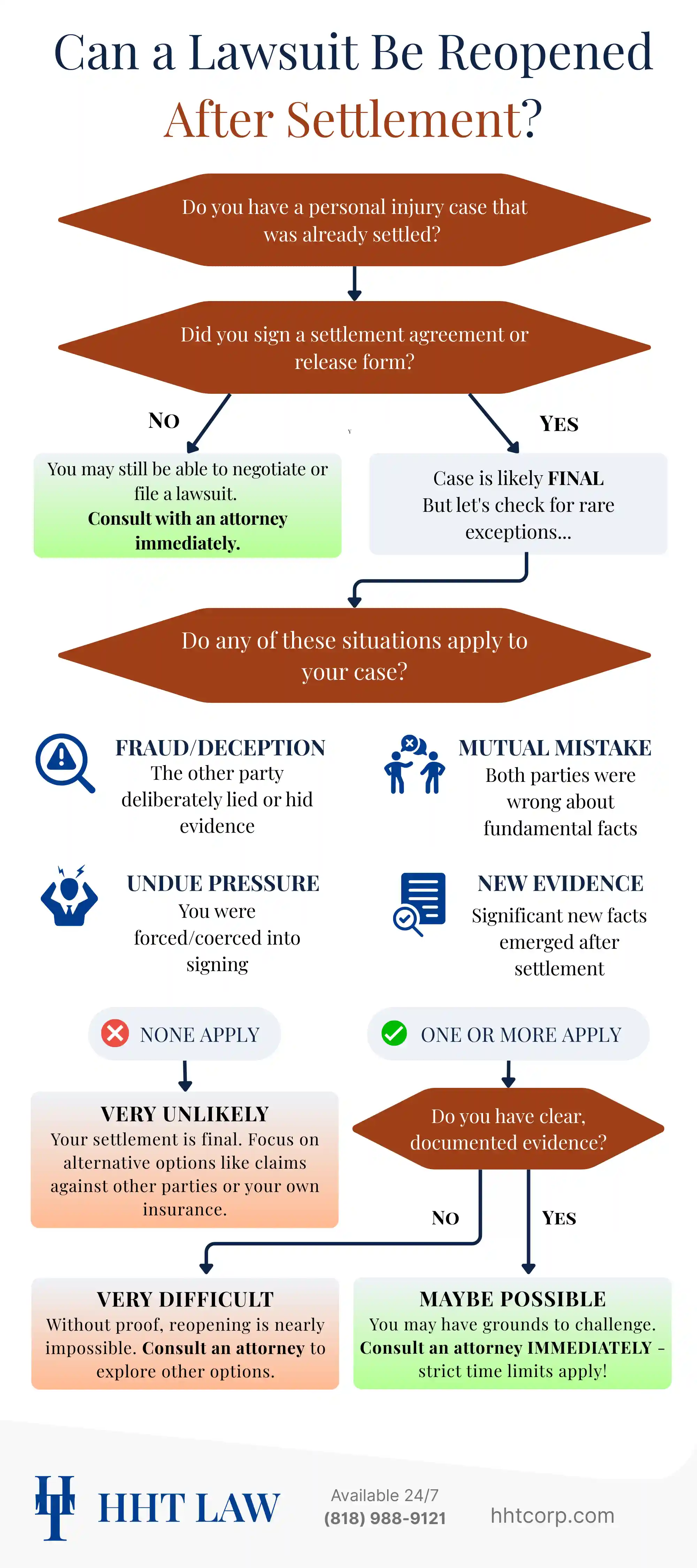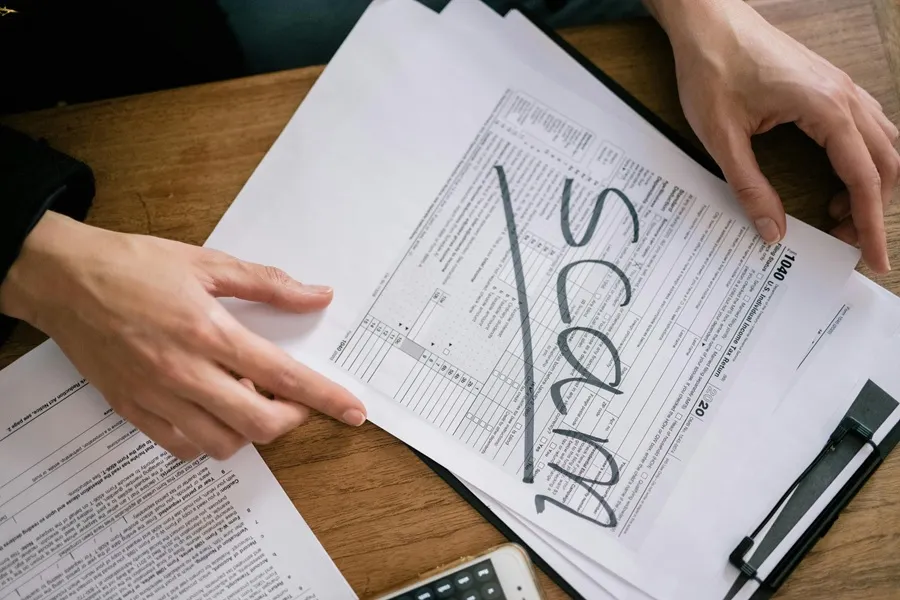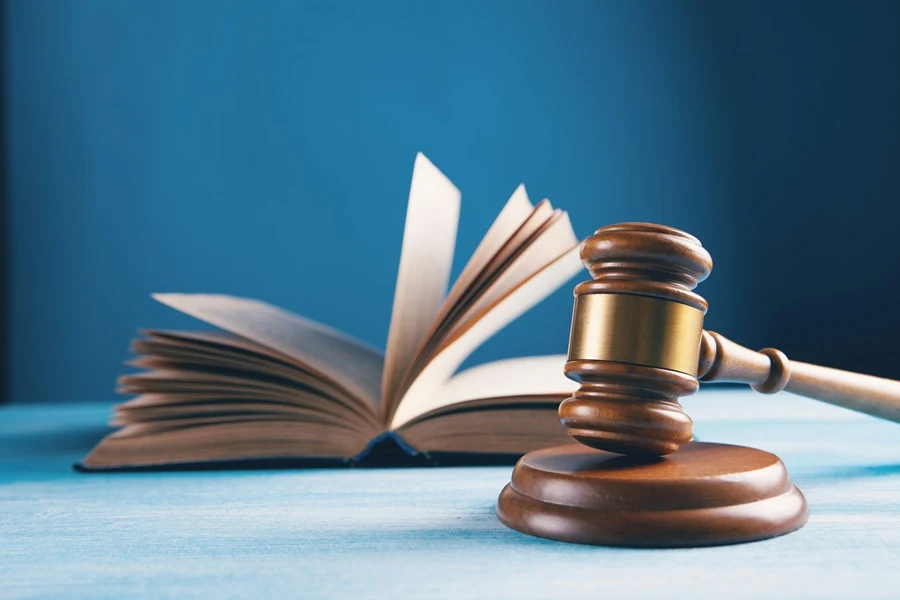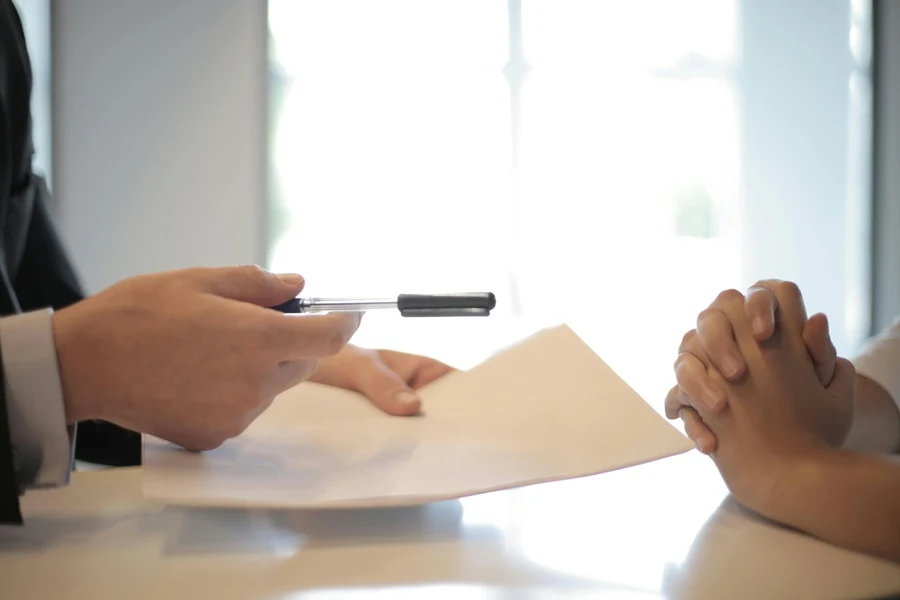The moment you cash the settlement check from your personal injury claim, you might feel a wave of relief, but uncertainty can also follow.
What if your medical condition worsens beyond your doctor’s expectations? What if key information emerges that wasn't available during negotiations? What if you're still in pain after settling and end up with more medical bills?
These concerns highlight a complex reality: While personal injury settlements promise closure, recovery can be anything but straightforward.
Understanding the dynamics of a personal injury case pre- and post-settlement is essential for anyone who wants to maximize their recovery and prevent further losses. In such cases, consulting an experienced San Fernando Valley personal injury lawyer is vital.
What Happens When You Settle a Personal Injury Case?
When you settle a personal injury case, you sign a release agreement (also called a release of liability). Signing this legal document has two important outcomes:
- The insurance company or defendant agrees to pay you a predetermined amount.
- You give up your right to pursue any additional legal claims related to the same accident.
A release agreement is intended to provide finality. Once signed, both parties can move forward knowing the matter is resolved. Ideally, the release will cover all losses related to your accident, including medical bills, lost wages, property damage, and pain and suffering.

Why Cases Can't Usually Be Reopened
In most personal injury cases, settlements are considered final and binding. California courts strongly favor upholding settlement agreements. There are important reasons for this:
- Legal finality: Order within the legal system depends on settlements being final. If they could easily be challenged, it would create uncertainty and chaos.
- Personal agreement: When you sign a release, you’re making a legally binding promise and waiving your legal right to seek further compensation for the same incident.
- Protection for all parties: Both sides rely on settlements being permanent when they agree to resolve cases out of court.
In short, settlement agreements serve to ensure that once cases are closed, they stay closed, preserving a sense of fairness and sparing all parties involved (as well as the courts) additional time, energy, and expense.
Rare Exceptions: When Reopening a Claim Might Be Possible
While extremely uncommon, California law recognizes a few situations where a settlement agreement might be called into question:
Fraud or Deliberate Deception

If the other party or their insurance company deliberately deceived you during settlement negotiations, you might have grounds to void the agreement. Examples include:
- Hiding evidence about the severity of your injuries
- Lying about available insurance coverage
- Concealing important facts about the accident
The challenge lies in proving the fraud with clear evidence, which is often difficult to obtain.
Mutual Mistake
If both parties were genuinely mistaken about a fundamental fact during negotiations, such confusion could impact the validity of an initial settlement offer. For instance:
- Both sides may have incorrectly believed your injuries were minor.
- Incorrect information about insurance policy limits may have influenced the settlement offer.
- Misunderstandings about who was legally responsible may have swayed negotiations.
Such a scenario could render an agreement void because both parties failed to understand the true conditions of the settlement and therefore couldn’t agree in good faith.
Pressure or Undue Influence

If you were forced to accept a settlement under circumstances that prevented you from freely making a decision, you might have legal recourse. This could happen if:
- You were heavily medicated in the hospital when signing.
- You were under extreme financial pressure that clouded your judgment.
- You didn’t have proper legal representation.
If any of these circumstances apply to your situation, contact your attorney right away for personalized guidance.
Discovery of New Evidence
Sometimes, significant new evidence emerges that wasn't available during the original negotiations. This may include:
- Medical discoveries showing that your injuries are more severe than initially diagnosed
- New witness testimony
- Identification of additional parties that may be responsible
Coming across game-changing evidence after the fact is rare, but it does happen.
Conditions That Won’t Allow You to Reopen a Personal Injury Case
Many situations that feel unfair don’t actually provide legal grounds to revise a settlement, such as:
- Simply realizing that you accepted too little money.
- Discovering that the defendant had more insurance than you knew about.
- Your injuries turning out worse than expected (unless fraud was involved).
- Unexpected medical complications arising later.
- Changing your mind about the settlement amount.
There are no “do-overs” when it comes to release agreements, so it’s imperative to make sure you’re satisfied with the terms of a particular settlement offer before you accept it.
Time Limits and Legal Deadlines
Even if you have valid grounds to challenge the finality of a settlement, you must act quickly.
California has strict time limits for these types of legal challenges. These deadlines are separate from but related to the standard statute of limitations for personal injury cases, which typically requires the plaintiff to file within two years of the injury date. By waiting too long, you could forfeit your options permanently.
A Better Approach: Getting It Right the First Time

Since reopening a case is so difficult, the best strategy is to make sure you receive fair compensation during the initial negotiations. Here's how to protect yourself and your rights.
Don't Rush to Settle
Take time to fully understand your injuries before accepting any offers. Many injuries don’t show their full impact immediately, and insurance companies often make low initial offers that don’t reflect the true value of a claim.
Wait for Medical Clarity
Doctors often recommend waiting until you reach maximum medical improvement before working out a settlement. This means your condition has stabilized, and medical professionals have a clear picture of your long-term prognosis.
That said, new medical bills or the need for additional therapy could arise as your condition evolves, so you should consider these potential expenses before agreeing to a settlement.
Understand Your Full Losses
A fair settlement should account for:
- All current and future medical expenses
- Lost wages and benefits
- Reduced earning capacity
- Pain and suffering
- Impact on your quality of life
A qualified attorney can review any offers you receive to ensure that they’re comprehensive and reflect the full value of your various losses.
Get Professional Legal Help

Insurance companies have teams of adjusters and lawyers working to minimize what they pay out. You need someone equally committed to fighting for your interests. Working with a trustworthy personal injury attorney who understands personal injury law is critical for protecting your rights and maximizing your potential compensation.
What to Do If You Think You Have Grounds to Challenge Your Settlement
If you believe your situation falls into one of the rare exceptions, here's what you should do:
- Consult a personal injury attorney: Don't try to handle things alone. An attorney at HHT Law can evaluate whether you have valid grounds to dispute your settlement.
- Organize all documentation: Gather up your original settlement papers, medical records, and correspondence with insurance companies, along with any new evidence.
- Act quickly: Legal time limits are strict, so don't delay if you think you have a case.
Alternative Options When You Can't Reopen Your Claim
If reopening your original case isn't possible, you might have other avenues, including the following:
- Pursuing other liable parties: If you discover that someone else contributed to your accident, you might be able to file a separate personal injury claim against them.
- Filing a claim against your own insurance: Uninsured/underinsured motorist coverage or other policies might provide additional compensation.
- Applying for workers' compensation: If your injury was work-related, you may have a separate workers' compensation claim.
Avoiding Post-Settlement Doubts

If you're currently dealing with a personal injury case, it’s wise to learn from the experiences of others.
Don't rush into a settlement just because you need money quickly. Take the time to understand your injuries, tally up your full losses, and work with an experienced personal injury attorney who will pursue maximum compensation on your behalf.
Remember that insurance companies are businesses focused on minimizing payouts. Their first offer is rarely their best offer, and it almost certainly won’t cover all your damages.
HHT Law: Knowledgeable Attorneys in the San Fernando Valley
Feeling like your personal injury settlement was unfair? HHT Law helps San Fernando Valley residents get the compensation they deserve. Since 2013, Hovhanes and Gohar Tatevossian have offered thorough case evaluations, ensuring that clients fully understand their prospective damages before settling.
At HHT Law, we believe in supporting our clients every step of the way. That’s why we offer a free consultation to help you understand your options and evaluate your case. Even better, you won’t pay any fees unless we win. We’re available 24/7 to address your questions and concerns. Our clients are like family to us, and we treat them accordingly.
Making the Right Decision for Your Case
While reopening a personal injury case is theoretically possible under very specific circumstances, it's extremely difficult and rarely successful. The best strategy is to focus on securing fair compensation during initial settlement negotiations rather than hoping to challenge an agreement later.
If you're currently handling a case, take the time to fully understand your losses before accepting any offers. Those who believe they have grounds to challenge a previous settlement should seek legal advice immediately, as strict time limits apply.
For individualized guidance on your specific situation, speak with a Pacoima personal injury attorney today. We look forward to meeting your legal needs and exceeding your service expectations.



